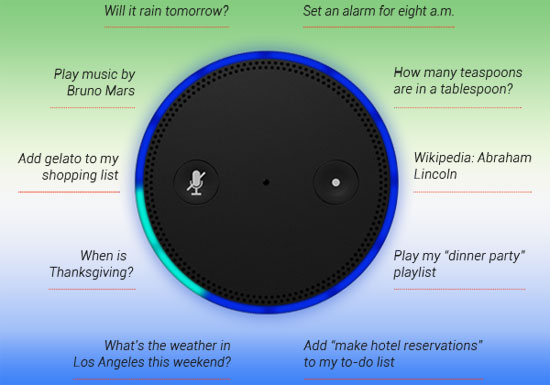About seven months of invitation-only exclusivity for Prime customers came to a close on Tuesday as Amazon opened up sales of Echo, its digital assistant hardware, to anyone willing to spend US$180 for it.
Amazon will start fulfilling new Echo orders on July 14, but shoppers can prepurchase the cylindrical tower now.
The Echo brings the might of Amazon Web Services into the living room, putting users in touch with the cloud platform via an array of embedded microphones and speakers.
Inside the Echo’s Chamber
The Echo cylindrical build packs two downward-firing speakers that produce omnidirectional sound. Around the crown of the Echo, Amazon has positioned seven far-field microphones that use beam forming to lock in on sounds emanating from any direction.
The device is animated by Alexa, digital assistant software that can call on Amazon Web Services to share whatever information users request.
Alexa can play music, read news reports, create to-do lists, fill to-do lists, tag appointments to calendars, fire back Wikipedia-sourced answers to whatever questions users toss her way, and even place Prime orders — at the user’s request, of course.
To accomplish these tasks, Alexa has access to Audible, Google Calendar, Pandora, traffic data, Amazon Music Library, Prime Music, TuneIn, iHeartRadio, NPR, ESPN, updates from major league sports, and more.
Alexa can communicate with connected home products from Philips and Wemo — so, for example, a user can ask her to turn off a Philips Hue smart bulb and she will.
Marketing to the Masses
The Echo went on sale to Amazon Prime customers last November, but it wasn’t the first Amazon product to be offered exclusively to members — and it follows that Amazon will use timed exclusivity on other products to coax consumers into its Prime ecosystem.
The use of timed exclusivity may have helped make the Fire TV and Fire TV Stick two of Amazon’s best-selling products, but the Echo has a relatively low chance of mass market success unless the company puts a broad marketing campaign behind the product, said Rob Enderle, principal analyst at the Enderle Group.
“This product is designed to be broad market, but someone has to create the broad segment for this class, and that typically takes a vendor like Apple who is willing to fund an adequate marketing campaign,” he told TechNewsWorld.
“Given the lack of success for the Apple Watch, it isn’t clear even Apple is willing to spend at the necessary level anymore,” Enderle mused.
Digital assistant products have had quite some time on the market, he noted. Most of them have been used by a small number of tech hobbyists, who generally have been dissatisfied with them, he said.
The Echo is “very different than anything currently in the home,” noted Enderle, “and the unevenness of Siri use means they can’t just call this Siri for the living room and create a segment.”
Reverberations Against Echo
Even if the Echo is publicized with the full force of Amazon behind it, the product still has to resonate with the masses in order to enjoy any sustainable success. For the Echo to do that, it has to build a sticky relationship with consumers, according to Charles King, principal analyst at Pund-IT.
The Echo has a least one potential sticking point. In several “very real ways,” it qualifies as an in-home Amazon sales associate, he pointed out.
“Each interaction between Echo and its owner results in a chain of data that allows Amazon to create a clearer, more meaningful customer portrait,” King told TechNewsWorld. “Outside of Jeff Bezos camping out on your living room sofa, Echo should help Amazon establish and nourish increasingly close and powerful customer relationships.”
Half a year ago, the Echo would have been “a toy for geeks” at best, in King’s view, but its rising app count, and variations within its software have started to change his perception of the product.
“For the time being, I think Echo will interest a fairly narrow range of consumers,” said King, “but over time, I expect its application areas and interest among potential buyers to broaden considerably.”





















































You know, it’s completely beyond me why anyone would want to buy what is essentially a piece of spyware, a "big data" collector. Honestly, they should be paying people for the privilege of spying on them – and I still wouldn’t want it…